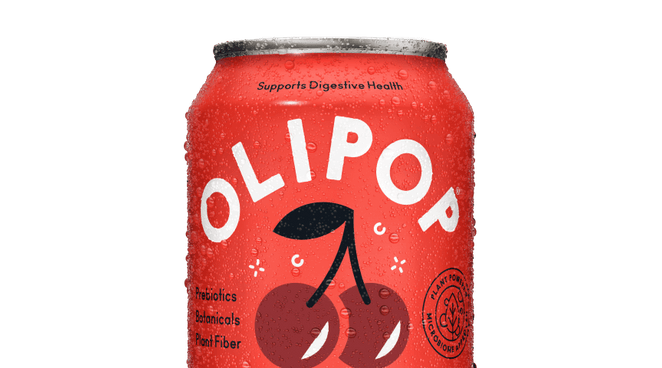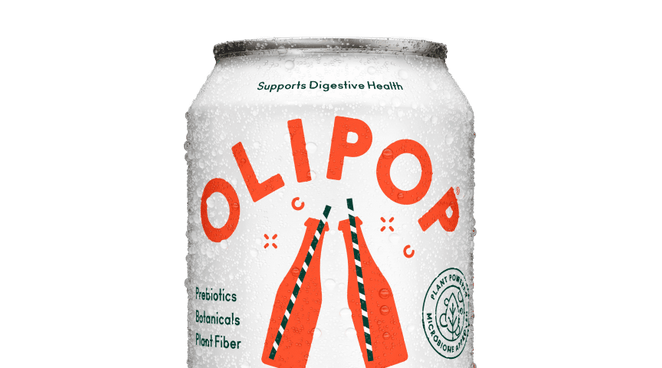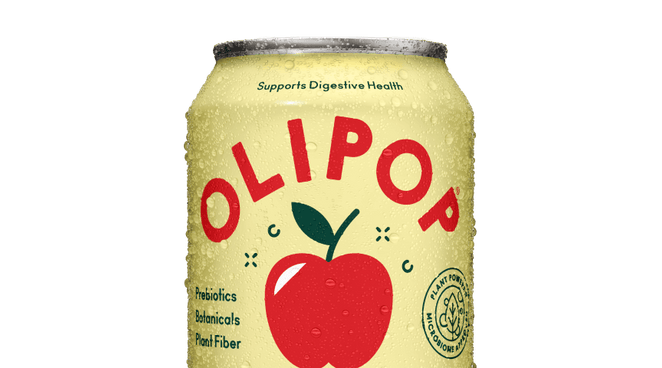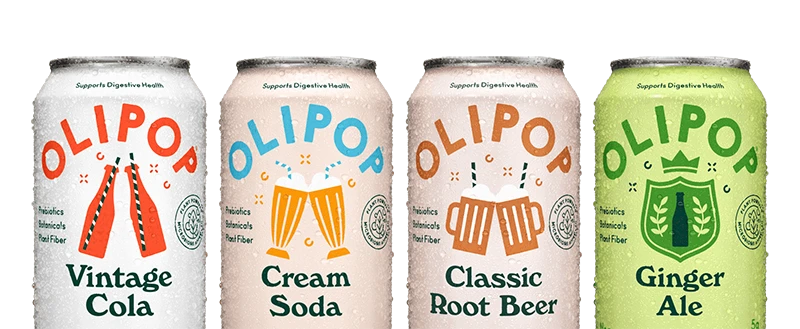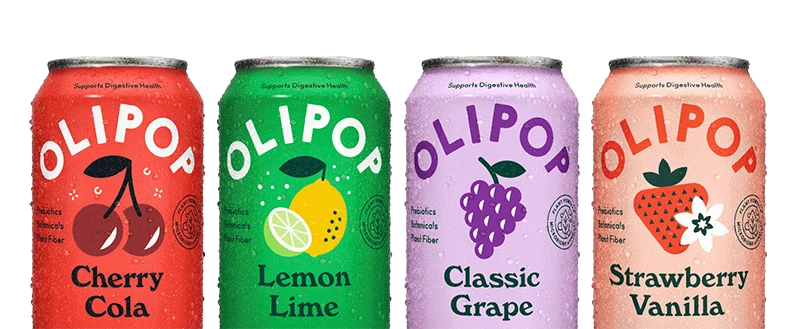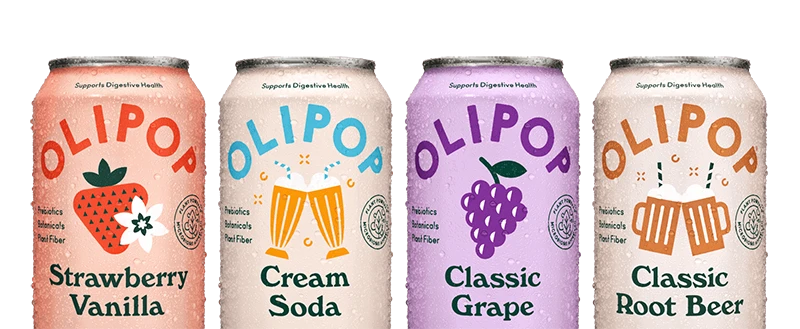Prebiotics are non-digestible food ingredients that stimulate the growth and activity of beneficial bacteria in your gut and have a known health benefit. Several non-digestible fibers are classified as prebiotics. Think of them as fuel for the good guys in your microbiome. While they don’t get the same spotlight as probiotics, they’re just as crucial when it comes to supporting your digestive health. That’s exactly why we pack 6 to 9 grams of prebiotic fiber into every 12-oz can of OLIPOP.
Here is everything you need to know about these underrated digestive superheroes, and how to deliciously sneak more of them into your daily routine.
What is Prebiotic Fiber?
Let’s break it down: prebiotic fiber is a type of non-digestible carbohydrate that helps feed the beneficial bacteria living in your gut microbiome.[1] When this fiber makes its way to your large intestine, your gut microbes ferment and transform it into supportive compounds like short-chain fatty acids (SCFAs).[2]
But not all fiber types serve as food for beneficial microbes, meaning not all fiber is prebiotic.[1] Some simply help move things along through your digestive tract, while others (like prebiotics) go the extra mile to support your digestive health.[3]
Prebiotics vs. Probiotics
You may be thinking, “wait, aren’t they called probiotics?” Nope! While they sound similar, prebiotics and probiotics are different.
Probiotics are living organisms, like bacteria, that live in your body and have a known health benefit to their host. These “good” bacteria line the inside of your gut and offer a host of beneficial roles. And just like all living things, probiotics need fuel to survive. And that's where prebiotics come in. In other words, if probiotics are the guests at your gut’s dinner party, prebiotics are the feast.
Think of it this way: Food entering your body could contain hazardous bacteria, and it’s the job of your gut microbiota, the makeup of all the bacteria in there, to keep the bad stuff at bay. Food also has the potential to introduce good bacteria, of course, so you can use your diet to make sure you’re feeding your gut prebiotics and probiotics to, in turn, keep your whole body healthy.
And here’s the good news: you control the menu. Studies show that what you eat can significantly alter the probiotics in your body within 24 hours, so you have a lot of power to affect your microbiota in the food and drink choices you make.[4]
General Health Benefits of Prebiotic Fiber
Speaking of keeping your body healthy, let’s talk about why prebiotic fiber is so beneficial. Here’s what the science says generally about maintaining prebiotic fiber intake:
- Supports Microbiome Health: Prebiotics help maintain a thriving gut ecosystem by increasing the number of beneficial bacteria, especially helpful strains like bifidobacteria and lactobacilli.[5]
- Encourages SCFA Production: When gut bacteria break down prebiotics, they produce beneficial compounds like short-chain fatty acids (SCFAs). SCFAs help support a healthy gut environment, encourage the growth of beneficial bacteria, and play a role in functions like digestion, nutrient absorption, and satiety (fullness).[2]
- Supports a Healthy Blood Sugar Response: Soluble prebiotic fibers, like guar gum, inulin, and resistant dextrin, have been shown to have a favorable impact on blood sugar levels, with foods in liquid formats (such as beverages or soups) having an even greater impact.[6]
- Supports Your Gut-Brain Axis: Your gut and your brain are connected via what’s known as the "Gut-Brain Axis," a series of bidirectional connections that may link your microbiome with your mood, cognition, and mental health. Therefore, a diet with prebiotic fiber to support a healthier microbiome may help support the gut-brain connection too.[7][8]
Prebiotic Fiber Foods & Drinks
So, it’s clear that prebiotic fiber is an essential part of your daily diet. Here are some of the highest prebiotic fiber foods and drinks to add to your plate:
- Asparagus
- Apples
- Banana (slightly underripe)
- Barley
- Cassava root
- Chickpeas
- Chicory root
- Fennel
- Garlic
- Jerusalem artichoke
- Leeks
- Onions
- Oats
- Barley
- Legumes
- OLIPOP! (Each 12oz can has 6 to 9 grams of prebiotic fiber)
A diet rich in a variety of fruits, vegetables, and other plants will help ensure you're taking in enough prebiotic fiber to help keep you (and your gut!) healthy. OLIPOP, as a high fiber beverage with prebiotics, can help supplement your diet with a little extra fiber.
Types of Prebiotics
Let’s dig a little deeper here. As you’re thinking about high prebiotic fiber foods and beverages, it’s important to consider that there are different types of prebiotic fiber, each with their own unique structure and function.
The two main types of prebiotics include:
Oligosaccharides
This type of prebiotic fiber includes:
- Fructo-oligosaccharides (FOS) – often found in bananas, chicory root, asparagus and Jerusalem artichoke
- Galacto-oligosaccharides (GOS) – often found in legumes, nuts, and seeds
- Inulin – often found in chicory root, Jerusalem artichoke, leeks, asparagus, and some fruits
- Resistant starch – often found in bananas, legumes, whole grains, nuts, and seeds
Oligosaccharides are short chains of sugar molecules and serve as a favorite food source for beneficial bacteria.[9] (Fun fact: The “OLI” in OLIPOP is a hat-tip to oligosaccharides!)
Polysaccharides
This type of prebiotic fiber includes:
- Pectin – often found in apples, citrus fruits, and carrots
- Gum arabic (also known as acacia fiber) – often used as a coating or texturizing agent in candies, chewing gum, and functional sodas (like OLIPOP!)
- Beta-glucan – often found in mushrooms, oats, barley, rye, and wheat
Polysaccharides are longer, more complex chains of sugars that tend to provide energy storage and structural support. While they aren’t quite as snackable to gut bacteria as oligosaccharides, they still help maintain a supportive environment in your microbiome.[9]
Prebiotic Fiber in OLIPOP
In each can of OLIPOP, we have a blend of soluble, prebiotic fibers. However, that blend depends on whether you’re drinking our refrigerated or shelf-stable OLIPOP.
Our refrigerated formula contains:
- Resistant dextrins from cassava root
- Inulin from chicory root and Jerusalem artichoke
Our shelf-stable formula contains:
- Resistant dextrins from cassava root
- Acacia Fiber
- Guar Fiber
For those doing their homework, you’ll notice that OLIPOP contains a blend of oligosaccharides (like resistant dextrins) and polysaccharides (like acacia fiber). Having a soda that contains a blend of prebiotic fibers is a deliciously simple way to support your digestive health.
Prebiotic Fiber: The Takeaway
Prebiotic fiber is a quiet powerhouse your gut can’t live without. As the essential fuel source for beneficial bacteria, prebiotics help keep your microbiome thriving. So, whether you’re loading up on oats and asparagus or cracking open a can of OLIPOP, you’re making choices that help your gut feel a little more balanced.
Bottom line? Fiber is your friend, especially prebiotic fiber. So, snack and sip up!
Sources:
- Prebiotics. (n.d.). International Scientific Association for Probiotics and Prebiotics (ISAPP). https://isappscience.org/topic/prebiotics/
- Blaak, E., Canfora, E., Theis, S., Frost, G., Groen, A., Mithieux, G., Nauta, A., Scott, K., Stahl, B., Van Harsselaar, J., Van Tol, R., Vaughan, E., & Verbeke, K. (2020). Short chain fatty acids in human gut and metabolic health. Beneficial Microbes, 11(5), 411–455. https://doi.org/10.3920/bm2020.0057
- Gibson, G. R., Hutkins, R., Sanders, M. E., Prescott, S. L., Reimer, R. A., Salminen, S. J., Scott, K., Stanton, C., Swanson, K. S., Cani, P. D., Verbeke, K., & Reid, G. (2017). Expert consensus document: The International Scientific Association for Probiotics and Prebiotics (ISAPP) consensus statement on the definition and scope of prebiotics. Nature Reviews Gastroenterology & Hepatology, 14(8), 491–502. https://doi.org/10.1038/nrgastro.2017.75
- Singh, R. K., Chang, H., Yan, D., Lee, K. M., Ucmak, D., Wong, K., Abrouk, M., Farahnik, B., Nakamura, M., Zhu, T. H., Bhutani, T., & Liao, W. (2017). Influence of diet on the gut microbiome and implications for human health. Journal of Translational Medicine, 15(1). https://doi.org/10.1186/s12967-017-1175-y
- Sarao, L. K., & Arora, M. (2015). Probiotics, prebiotics, and microencapsulation: A review. Critical Reviews in Food Science and Nutrition, 57(2), 344–371. https://doi.org/10.1080/10408398.2014.887055
- Giuntini, E. B., Sardá, F. a. H., & De Menezes, E. W. (2022). The effects of soluble dietary fibers on glycemic Response: An Overview and Futures Perspectives. Foods, 11(23), 3934. https://doi.org/10.3390/foods11233934
- Akpinar, O. (2018b). The gut-brain axis: interactions between microbiota and nervous systems. Journal of Cellular Neuroscience and Oxidative Stress, 10(3), 783. https://doi.org/10.37212/jcnos.610103
- Güven, B., Gülerman, F., Akyüz, E., & Aydın, G. (2020b). Emotional dysregulation in adolescents with functional gastrointestinal disorders. Arab Journal of Gastroenterology, 21(1), 24–27. https://doi.org/10.1016/j.ajg.2020.02.002
- Yao, T., Ma, M., & Sui, Z. (2023). Structure and function of polysaccharides and oligosaccharides in foods. Foods, 12(20), 3872. https://doi.org/10.3390/foods12203872
- Prebiotics are non-digestible fibers that the beneficial bacteria in your gut need to survive. They play a crucial role in maintaining your digestive health.
- Prebiotic fiber offers numerous health benefits, including supporting the growth of beneficial bacteria in the gut.


